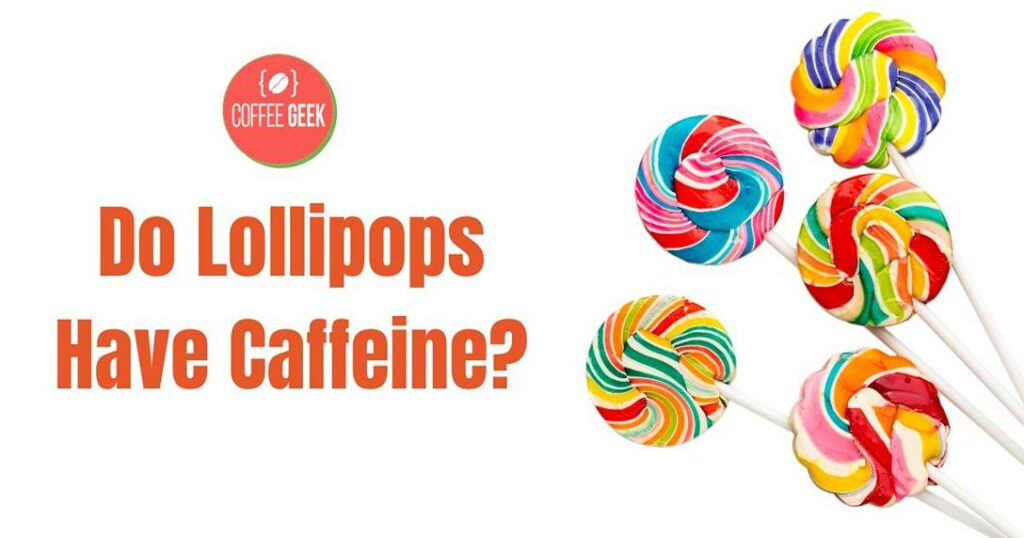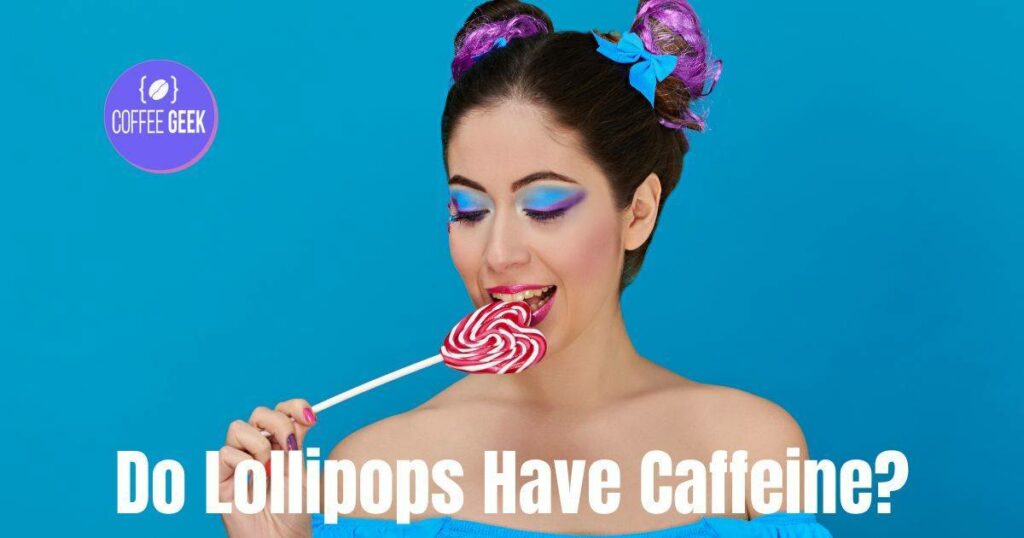Lollipops are a popular sweet treat enjoyed by people of all ages.
Often made from sugar, corn syrup, and various flavorings, these candies might seem harmless at first glance.
However, there’s a hidden ingredient that might come as a surprise – caffeine. Do lollipops have caffeine?

Yes, that energy booster we find in our morning coffee can be lurking in your favorite lollipop.
Although caffeine is commonly associated with drinks like coffee, tea, and soda, it can also be found in various other products such as chocolates and some medications.
If you’re curious to know if your beloved lollipop is hiding a secret caffeine kick, it’s crucial to understand that not all lollipops contain caffeine.
While most traditional sweets are caffeine-free, there are specific specialty lollipops that do contain small amounts of this stimulant.
Key Takeaways
- Caffeine can be found in some specialty lollipops but is not present in most traditional varieties.
- Consider checking the label of your favorite lollipop to determine if it contains caffeine.
- Be mindful of your overall caffeine intake and its potential health implications when consuming caffeinated products.
Understanding Caffeine

Caffeine Content in Common Foods and Drinks
Everyone knows that caffeine can be found in the coffee you order, but you might not be aware that it also exists in a variety of other foods and drinks.
Some common sources of caffeine include tea, chocolate, and energy drinks.
Here’s a brief overview of the caffeine content in these items:
- Coffee: A standard 8-ounce cup of brewed coffee contains around 95 mg of caffeine, while a shot of espresso has about 63 mg.
- Tea: The caffeine content in tea varies depending on the type. For instance, an 8-ounce cup of black tea typically has 47 mg of caffeine, whereas green tea contains 28 mg.
- Chocolate: The amount of caffeine in chocolate depends on the type and quality. On average, a 1-ounce serving of dark chocolate has 12 mg, and hot chocolate has around 5 mg.
- Energy drinks: These beverages often pack a hefty dose of caffeine, with some brands containing over 200 mg per serving.
You should be mindful of your caffeine intake when consuming these foods and drinks, especially if you are sensitive to caffeine.
The Effects of Caffeine on the Body
Caffeine is a natural stimulant that affects your central nervous system, which is why it can give you an energy boost when you need it.
However, the effects of caffeine on your body can be unhealthy and can vary depending on factors like your overall health, weight, and tolerance level.

Some common short-term effects include:
- Increased alertness
- Improved mental performance
- Enhanced physical endurance
While moderate ingestion of caffeine appears to be safe for most individuals, excessive intake can lead to adverse effects such as:
- Increased heart rate
- Jitteriness
- Sleep disturbances
If you’re sensitive to caffeine or experiencing these negative side effects, consider reducing your intake or opting for caffeine-free alternatives.
Do Lollipops Have Caffeine?

Common Ingredients in Lollipops
Lollipops are popular sweet treats that typically consist of a hard candy on a stick.
The main ingredients in most lollipops include sugar and corn syrup.
These ingredients create a hard and sweet base that is then flavored with various ingredients, such as fruit extracts or flavorings.
Some lollipops also contain additional ingredients like food coloring or sprinkles to enhance their appearance.
Caffeine Presence in Lollipops
In general, traditional lollipops do not contain caffeine.
However, there are some specialty lollipops on the market that do include caffeine as an ingredient.
These caffeinated lollipops can provide a mild energy boost, but often contain less caffeine than a typical cup of coffee.
For example, Kopiko Coffee Candy has 25 mg of caffeine per serving.
Other coffee candies may contain varying amounts of caffeine depending on the specific candy and the presence of real coffee in the ingredients.
Lollipops Targeted at Adults
While most lollipops are marketed towards children, there are some lollipops specifically made for adults.
These adult-targeted lollipops can include a variety of unique flavors, including those with caffeine, alcohol, or other unconventional ingredients.
Caffeine-Centric Products

In recent years, there has been a growing trend of incorporating caffeine into various products.
Some of these items include candies, gums, and chocolates.
Caffeinated Candies and Gums
There are several caffeinated candies and gums on the market designed to provide an energy boost.
For example, Jolt Gum offers a convenient way to consume caffeine without having to drink coffee or energy drinks.
Each piece of Jolt Gum contains 45mg of caffeine, making it a quick and easy way to get your caffeine fix.
There are also caffeinated candies, with some even having up to 80mg of caffeine per piece.
Here’s a brief list of popular caffeinated candies and gums:
- Jolt Gum
- Stay Awake Caffeine Gum
- Penguin Fizzy Candy
- VitaTops
Coffee-Infused Treats
If candies and gums aren’t your preferred caffeinated delights, there are alternatives such as coffee-infused treats that offer both caffeine and delicious flavors.

One of the most popular products in this category is the Awake Chocolate, which provides around 50 to 100mg of caffeine per piece.
These coffee-flavored chocolates are a tasty way to boost your energy levels during a midday slump.
Some other coffee-infused treats include:
- Coffee Crisp Chocolate Bar
- Kopiko Coffee Candy
- Trader Joe’s Coffee Lovers Espresso Beans
Alternatives to Caffeinated Lollipops
While it’s true that some specialty lollipops may contain caffeine, many regular lollipops don’t.
In case you want to avoid these caffeinated variants, there are plenty of non-caffeinated lollipops that offer a sweet treat without the risk of added caffeine content.
If you’re seeking a natural and low-caffeine alternative to these candies, consider exploring dark chocolate with low sugar content or nuts like almonds, which provide a healthy energy boost.
Health Considerations

Caffeine Sensitivity and Children
Some lollipops contain caffeine, which may come as a surprise. It is crucial to take note of this, especially if you or your children are sensitive to caffeine.
Excessive caffeine consumption can cause jitteriness, restlessness, and other negative side effects.
If you or your children are sensitive to caffeine, it’s essential to avoid caffeinated lollipops and opt for non-caffeinated varieties instead.
Dental Health and Sugar Content
In addition to caffeine, lollipops are notorious for their high sugar content.
Consuming sugary treats like lollipops may satisfy your sweet cravings, but it can also contribute to tooth decay.
It’s essential to maintain proper dental hygiene, such as brushing and flossing regularly, after consuming lollipops to minimize the risk of developing cavities.
Reading Nutrition Labels for Caffeine
To ensure you’re making informed choices when selecting lollipops, always check the nutrition label.
This will indicate if the lollipop contains caffeine and help you manage your overall caffeine consumption.
The label may also list other ingredients like peanut butter, which some individuals may be allergic to.
By reading the nutrition label, you can easily avoid products with harmful ingredients and cater to any dietary restrictions or preferences.
Conclusion
When considering whether lollipops contain caffeine, it’s crucial to understand the typical ingredients that go into these sweet treats.
Generally, lollipops are made from sugar, corn syrup, flavorings, and colorings; caffeine is not a standard ingredient.
However, there are specialty lollipops designed with adults in mind that may include caffeine for an energy boost, similar to the way caffeine is found in coffee and tea.
For those who love indulging in lollipops and are concerned about caffeine intake, it’s good news that most traditional lollipops you’ll find in stores are caffeine-free. Yet, for every rule, there are exceptions.
Specialty confectioners have created lollipops with caffeine, catering to those who seek a little energy kick away from their usual cup of coffee or tea.
It’s important to remember that the caffeine content in these products can vary significantly.

Some might contain as much caffeine as 30 mg per lollipop, which is about a third to half the amount found in an average cup of coffee, depending on the blend and preparation method.
For those trying to compare the caffeine content in lollipops to other sources of caffeine or who are concerned about their overall intake throughout the day, reading labels and product descriptions is key to learn the details.
Unlike traditional sweets, caffeine-infused lollipops are geared more towards adults looking for a convenient and unconventional caffeine source.
As with any caffeinated product, moderation is essential.
Too much caffeine can lead to unwanted side effects, making it important to be mindful of how much you consume every day, especially if you’re sensitive to caffeine or have underlying health concerns.
Remember, while it may feel like an exciting gear shift to try caffeinated lollipops, they’re not for everyone and should be enjoyed responsibly, keeping in mind their unique content compared to more common sources like coffee and tea.
Frequently Asked Questions

Are there any caffeine-free lollipops available?
Yes, there are caffeine-free lollipops available. In fact, most lollipops do not contain caffeine.
However, some specialty lollipops do contain this stimulant. It is always best to check the ingredient list to ensure that the product is caffeine-free.
Which lollipop brands include caffeine in their products?
While most lollipop brands don’t include caffeine in their products, there are a few that do.
These brands usually market their caffeinated lollipops as energy-boosting or as an alternative to coffee.
Check the packaging or research the specific brand to determine if they include caffeine in their lollipops.
Can you find caffeine in flavored lollipops like Strawberry Vanilla?
In general, flavored lollipops such as Strawberry Vanilla do not contain caffeine.
However, some specialty lollipops with unique flavors may still contain this stimulant.
It is essential to read the label to ensure that the lollipop is caffeine-free, especially if you are sensitive to caffeine.
Is caffeine a common ingredient in candy or lollipop drinks?
Caffeine is not a common ingredient in candy or lollipop drinks; however, there are exceptions to this rule.
Some specialty beverages, like energy drinks, may include candy or lollipop-flavored products that contain caffeine.
As always, it’s essential to read the ingredient list to determine if caffeine is present.
Are there specific lollipop flavors that typically contain caffeine?
The most common lollipop flavors that may contain caffeine are coffee or chocolate-related flavors.
For instance, a mocha-flavored lollipop is more likely to contain caffeine than a fruit-flavored one.
However, it is necessary to check the ingredient list or look for a specific indication that the lollipop contains caffeine before assuming that it does.
How can I determine if a lollipop has caffeine without reading the label?
It is challenging to determine whether a lollipop contains caffeine without reading the label since most lollipops do not taste like caffeine.
If you cannot read the label, it is best to opt for a different lollipop or contact the manufacturer for more information about the product’s caffeine content.

